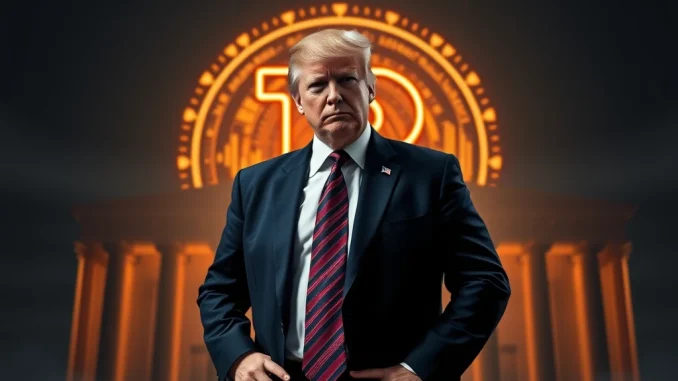
In a stunning admission that has sent ripples through both the political and financial spheres, Eric Trump, son of former U.S. President Donald Trump, has unveiled the compelling reason behind his entry into the world of cryptocurrency. According to a recent interview on Fox Business, Eric Trump’s journey into digital assets was sparked not by speculative investment fervor, but by what he describes as a targeted campaign against his family by major U.S. banks. This revelation throws a spotlight on the growing intersection of politics, finance, and the burgeoning crypto landscape. Let’s delve deeper into this eye-opening narrative and understand the factors that pushed a Trump into the arms of crypto.
Why Eric Trump Embraced Crypto After Bank Account Closures
Eric Trump’s statement is nothing short of explosive. He claims that the decision to explore cryptocurrency was a direct consequence of several prominent U.S. banks abruptly closing accounts associated with the Trump family. He specifically named institutions like JPMorgan Chase, Bank of America, Capital One, TD Bank, and First Republic, painting a picture of a coordinated financial blockade. For someone who perhaps hadn’t previously considered the revolutionary potential of digital currencies, this action served as a powerful catalyst.
Here’s a breakdown of the key points from Eric Trump’s disclosure:
- Account Closures: Multiple major U.S. banks, including JPMorgan Chase, Bank of America, Capital One, TD Bank, and First Republic, reportedly closed accounts linked to the Trump family.
- Perceived Attack: Eric Trump characterized these closures as an ‘attack’ on his family, suggesting a politically motivated move rather than standard banking procedures.
- Crypto as a Response: Faced with what he perceived as financial censorship, Eric Trump turned to cryptocurrency as an alternative financial system, highlighting its decentralized and censorship-resistant nature.
- Unexpected Crypto Advocate: He admitted that he ‘never thought he would get into crypto’ before these events, indicating that the bank actions were the primary driver for his crypto adoption.
Banks Close Trump Family Accounts: A Closer Look at the Allegations
The claim that several major banks simultaneously decided to close Trump family accounts raises serious questions. While banks routinely close accounts for various reasons, including risk management and compliance, the sheer number and the profile of the individuals involved add layers of complexity. Was this a coordinated action? Was it politically motivated, as Eric Trump suggests? Or were there legitimate financial or regulatory reasons behind these decisions?
It’s important to consider different perspectives:
| Perspective | Possible Explanation |
|---|---|
| Eric Trump’s View: | Politically motivated attack, financial censorship, banks acting in concert to marginalize the Trump family. |
| Banks’ Potential View: | Risk management, compliance concerns, reputational risk associated with the Trump brand, routine account reviews, and adherence to regulatory frameworks. |
| Skeptics’ View: | Exaggeration for political gain, deflection from other issues, leveraging controversy to promote cryptocurrency. |
Without further details or official statements from the banks themselves, it remains speculative to definitively determine the motivations behind these account closures. However, Eric Trump’s narrative has undeniably thrust the issue of financial censorship and the appeal of decentralized finance into the spotlight.
The Importance of Crypto: A Censorship-Resistant Financial System
Eric Trump’s experience, whether perceived as an ‘attack’ or a standard banking practice, underscores a core tenet of the cryptocurrency movement: the promise of a censorship-resistant financial system. Cryptocurrencies, by their very nature, operate outside the traditional banking infrastructure. They are decentralized, meaning no single entity controls them, and transactions are typically peer-to-peer, validated by a distributed network rather than centralized institutions.
This decentralized nature offers several potential benefits, especially in scenarios like the one described by Eric Trump:
- Reduced Censorship: Cryptocurrency transactions are inherently more difficult to censor or block compared to traditional banking transactions, which are subject to the rules and regulations of banks and governments.
- Financial Autonomy: Individuals have greater control over their funds and transactions, reducing reliance on intermediaries like banks.
- Global Accessibility: Cryptocurrency networks operate globally, potentially offering financial access to individuals and entities that may be excluded from traditional banking systems.
- Transparency and Security: Blockchain technology, which underpins most cryptocurrencies, provides a transparent and auditable record of transactions, while cryptographic security measures protect against fraud and unauthorized access.
Trump Family Banks and the Broader Implications for Crypto Adoption
While the specific circumstances surrounding the Trump family’s bank accounts are unique and politically charged, the underlying issue resonates with a broader segment of the population concerned about financial freedom and potential overreach by centralized institutions. Eric Trump’s public declaration of his entry into crypto, driven by these bank closures, could serve as a powerful endorsement for the digital asset space, particularly among those who share similar concerns about censorship and financial autonomy.
Here are some potential implications of this narrative for cryptocurrency adoption:
- Increased Awareness: The story will undoubtedly raise awareness about cryptocurrency among individuals who may not have previously considered it, especially within political and financial circles aligned with the Trump family.
- Legitimization: A prominent figure like Eric Trump embracing crypto, even if driven by controversial circumstances, can contribute to the gradual legitimization of digital assets in the eyes of the public.
- Fueling the Decentralization Narrative: This event reinforces the narrative of cryptocurrency as a solution to potential financial censorship and the need for decentralized alternatives to traditional banking.
- Potential Regulatory Scrutiny: Increased visibility and adoption could also lead to greater regulatory scrutiny of the cryptocurrency space, as governments and financial institutions grapple with its growing influence.
Actionable Insights: What Can We Learn from Eric Trump’s Crypto Journey?
While not everyone may face the same circumstances as the Trump family, Eric Trump’s move into crypto offers some valuable insights for anyone considering digital assets:
- Diversification Beyond Traditional Finance: Explore cryptocurrencies as a potential tool for diversifying financial holdings beyond traditional banking and investment systems.
- Understanding Decentralization: Educate yourself about the principles of decentralization and how cryptocurrencies can offer greater financial autonomy and resilience.
- Risk Assessment and Due Diligence: While crypto offers benefits, it’s crucial to understand the risks involved, including volatility, security concerns, and regulatory uncertainties. Conduct thorough research before investing.
- Advocacy for Financial Freedom: Engage in discussions about financial censorship and the importance of protecting financial freedom in the digital age.
Conclusion: A Pivotal Moment for Crypto and Financial Freedom?
Eric Trump’s unexpected entry into cryptocurrency, triggered by the closure of Trump family accounts at major U.S. banks, is more than just a personal anecdote. It’s a powerful illustration of the growing appeal of decentralized finance in an era of increasing financial scrutiny and control. Whether you agree with his political views or the interpretation of events, Eric Trump’s story serves as a potent reminder of the potential of cryptocurrency to offer an alternative, censorship-resistant financial system. As the lines between politics, finance, and technology continue to blur, this episode could mark a pivotal moment in the ongoing narrative of crypto adoption and the pursuit of financial freedom in the 21st century. The unfolding story of Eric Trump and crypto is certainly one to watch, as it may well shape the future landscape of digital finance and its intersection with power and politics.



